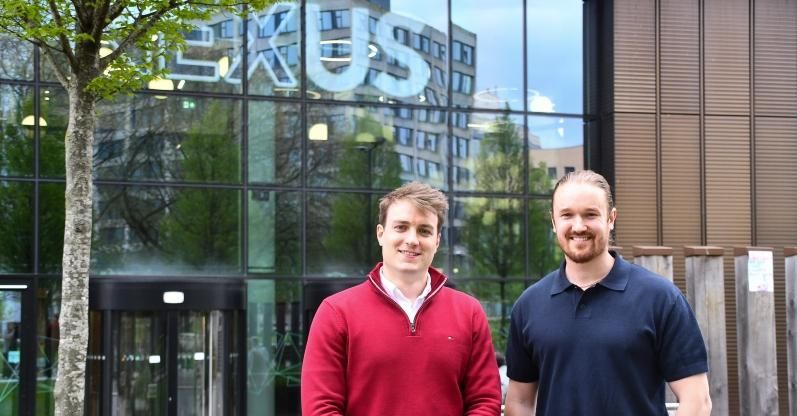
The founder of a social enterprise that helps disadvantaged people back into work has been recognised in a list of Europe’s top young entrepreneurs.
University graduate Lyndon Timings-Thompson has - along with his business partner James McBride - received the honour of being listed on the 30 under 30 Forbes List in Europe.
Lyndon, 29, and James, 28, run their company, We are Social Enterprise Recruitment, from Nexus, the state-of-the-art innovation business hub on campus.
Lyndon became a Spark scholar after he learnt he could apply for the scheme as a recent alumni, and he says the help and support he has received through the Spark scheme has been “invaluable”.
Spark is the name for the business start-up service based in the University of Leeds Career Centre.
As company directors, Lyndon and James and their team of employees trade as an agency that finds employees for the construction industry.
The Spark programme has been a very useful programme. The quality of office space provided at the Nexus building on campus is amazing which is important when you’re wanting to attract the best talent.
The social enterprise also supports disadvantaged people – people who have been out of work for some time for various reasons such as suffering from ill health, being in prison, or looking after children.
“The Spark programme has been a very useful programme,” said Lyndon. “The quality of office space provided at the Nexus building on campus is amazing which is important when you’re wanting to attract the best talent.
“There is also a great network to access as there are so many things you don’t know when you start up a business. You can speak to experts in their fields such as HR which can give you advice on such matters.”
Lyndon, who studied Geological Sciences at the University between 2013 and 2016, met James, a University College London graduate, when they were both working in a bar in Sheffield.
Lyndon was applying for jobs and got a graduate job with Wates where he learnt about the construction industry but was also tasked with engaging with social enterprises.
He became really interested in social enterprises and felt he could fill a gap with his own company. He approached James because he had a lot of business acumen. They were a natural match.
“We work with third party organisations such as those who help ex-offenders to fund qualifications or offer workshops that help them build their CVs and interview techniques.”
Social enterprises are businesses that make a profit – unlike a charity. “We operate a traditional business model but commit profits to achieve a social goal,” said Lyndon.
“We work with third party organisations such as those who help ex-offenders to fund qualifications or offer workshops that help them build their CVs and interview techniques.”
He explained that the qualification most people have to have in the construction industry is the Construction Skills Certification Scheme (CSCS) card which indicates those individuals have appropriate training.
Attending the course to get the CSCS card can cost around £300 which is a lot of money for someone who is not employed, so they fund the training for them.
“I don’t mind if they find employment elsewhere,” said Lyndon. “Just as long as it helps them on their way.
“We like to work with like-minded companies that are socially and community orientated. We also enjoy working with local companies to create employment opportunities for local people.”
The total revenue for We Are Social Enterprise Recruitment since it formed is £4.5 million and they have placed more than 500 individuals from disadvantaged backgrounds into roles.
For every £1 spent with the business, they have generated £1.95 worth of social value and a total amount of £8.6 million as per the national TOMS calculator.
We are Social Enterprise is one of several recruitment businesses owned by the two founders which also includes an executive search agency trading in the US construction and civil engineering market.
Professor Nick Plant, Deputy Vice Chancellor: Research and Innovation, who nominated Lyndon for the Forbes list, said: “Lyndon is a shining example of what people can achieve if they have the right ideas and ambition.
“We were delighted to support him as part of the Spark programme. It was clear he had a great vision that he could execute with his knowledge of the industry and his relationship-building experience.
“He is very driven but also has a keen sense of social responsibility which is a winning combination in terms of making a profit but also making a valuable contribution to society.”